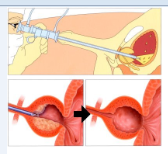Surgery for prostate
TURP is usually done to ease symptoms caused by an enlarged prostate. It’s the surgical removal of part of the prostate gland and is by far the most common surgical procedure used for benign prostate disease.

What is TURP
TURP is a procedure to resect the prostate which may be enlarged in a condition called benign prostatic hypertrophy (BPH), commonly found in elderly men.
The prostate is a small, chestnut shaped gland composed of different lobes enclosed in a fibrous capsule. Located just below the bladder and in front of the rectum, the prostate also surrounds the urethra, the canal through which urine is passed out of the body.
What happens during TURP?
An endoscope is inserted through the penis, and the portion of the gland is removed, relieving the compression on the urethra. This may be likened to removing the pulp of an orange fruit while leaving the skin intact. The operation time varies from half an hour to two hours, with no incision on the skin. The amount of prostate removed during TURP is less than that reported on ultrasound, as the latter always overestimates.
What happens after the operation?
At the end of the surgery, a urethral catheter is placed to drain urine from the bladder into a collection bag. Urine is drained this way for a few days allowing the surgical wound to heal undisturbed. In some instances, your bladder may be irrigated (flushed with water) via the catheter to keep it clean.Once irrigation has stopped, you may notice that your urine is a little red. Don’t be alarmed as some bleeding is normal. It should clear up by the time you are discharged from the hospital.
Taking care of yourself after the surgery?
- Following TURP, you will not experience too much discomfort. You should avoid lifting heavy objects or strenuous exercise for three to four weeks after surgery.
- Many patients notice a pinkish tinge to the urine immediately following the operation. Check with your doctor if the blood seems excessive. You may also experience a burning sensation when urinating for a few days.
- During the fortnight or so after surgery, blood may reappear in the urine for a short time. If this occurs, drink plenty of water and limit activity. But do not exceed two liters of water a day. Try not to drink before you go to bed or you may be awakened by a full bladder otherwise.
- It is advisable to refrain from sex for a month or so. Do continue your annual prostate examination as prostate cancer can still appear from the remnant in the capsule.
- There are usually no specific dietary restrictions. However, you should take lots of high fiber diet and fruit to ensure smooth bowel movement, without straining.
- The regular TURP that is described so far is technically called monopolar TURP. If we use bipolar generator, then it is called bipolar TURP. The latter has advantage in that we used isotonic saline and lesser chances of developing electrolyte disturbance like TUR syndrome.
- Again there are newer methods of enucleating the prostate compared to conventional resection of prostate
How is BPH Diagnosed?
It is usually diagnosed by a combination of some of the following methods:
- Digital rectal examination
- Measurement of the urine flow using a flow-meter (uroflowmetry)
- Ultrasound of the urinary tract to measure post-void residual urine, prostate size, bladder wall thickness and to look for any swelling of the kidneys (hydroureteronephrosis)
Will I experience pain during surgery?
TURP is performed using spinal anaesthesia or general (whole body) anaesthesia, in which the anaesthesia is given by injection, inhalation or both to induce a loss of sensation and consciousness. Hospital stay for TURP is usually two to four days, depending on associated medical factors.
Is TURP safe?
No operation is completely risk-free, but TURP is generally safe and effective. Some possible complications could include urinary tract infection in 4%, bleeding requiring transfusion in 1%, urethral stricture in 7%, bladder neck contractures in 4%, retrograde ejaculation in 16-95% and urinary incontinence 1-2% which usually gets better over a period of 3-6 months. Do speak to your surgeon if you need more details.